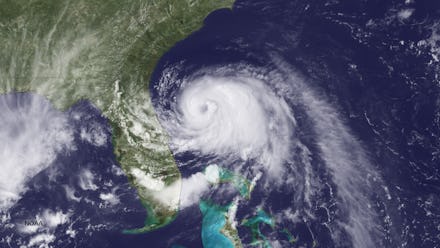Climate Change Has Found a New Victim: Gravity

The news: If you're still having trouble believing climate change is a real thing, here is another item on the list of things affected by global warming: gravity.
According to the latest report by the European Space Agency, detailed satellite imaging has shown that "the loss of ice from West Antarctica between 2009 and 2012 caused a dip in the gravity field over the region."
While gravity might seem like a fixed concept, it actually varies across the Earth's surface depending on planetary rotation, latitude, altitude and geology. And while this latest shift is nothing to be alarmed about (penguins aren't suddenly going to drift into space), it is a big indication of how much ice we are quickly losing in West Antarctica.
Why is this happening? Earlier this year, researchers reported that the melting of Antarctic glaciers might be "unstoppable." Although the whole process might take take more than 200 years, estimates indicate that this can raise sea levels by more than a meter, which could have a devastating effect on coastal regions.
And as temperatures rise throughout the globe, the warmer waters continue to erode the underside of floating ice, making the alarming scenario more and more likely. If you want to see what the process looks like, here is a visualization by NASA:
NASA also posted this time-lapse GIF of the Amundsen Sea region in western Antarctica, which has become more unstable and vulnerable over the years:
What does this mean? In short, a dangerous chain reaction. NASA reports:
"Ocean heat eats away at the ice, the grounding line retreats inland and ice shelves lose mass. When ice shelves lose mass, they lose the ability to hold back inland glaciers from their march to the sea, meaning those glaciers can accelerate and thin as a result of the acceleration. This thinning is only conducive to more grounding line retreat, more acceleration and more thinning. In this equation, more ice flows to sea every year and sea level rises."
While it might be easy to dismiss all this as conjecture taking place in a remote part of the world, what is happening in West Antarctica has a real effect throughout the globe: Sea ice serves a crucial climate function by reflecting sunlight back into space. If it melted away, the dark water would absorb more sunlight and contribute to warmer temperatures, erode coastlines and change the habitat of arctic species, including polar bears — effectively perpetuating the feedback effect.
And as shown by the U.N. Intergovernmental Panel on Climate Change report this past March, the consensus in the scientific community is that these environmental changes will exacerbate existing sociopolitical issues, such as economic crisis in coastal areas and resource insecurity, leading to climate-change-related migration, conflict and security problems.
So while a small dip in gravity might not a cause for alarm, it is a sign of more serious trouble to come.